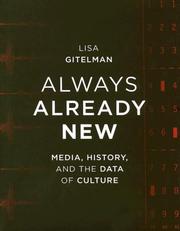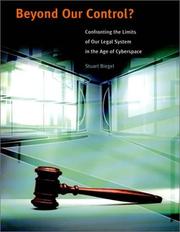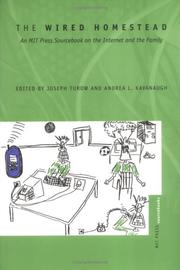| Listing 1 - 10 of 47 | << page >> |
Sort by
|
Book
ISBN: 0262258153 1282694421 9786612694424 0262258730 Year: 2009 Publisher: Cambridge, MA : MIT Press,
Abstract | Keywords | Export | Availability | Bookmark
 Loading...
Loading...Choose an application
- Reference Manager
- EndNote
- RefWorks (Direct export to RefWorks)
What are the global implications of the looming shortage of Internet addresses and the slow deployment of the new IPv6 protocol designed to solve this problem? This book looks at this question and much more.
Book
ISBN: 1282638327 9786612638329 0262272083 9780262272087 9781282638327 9780262014397 0262014394 9780262513739 0262513730 Year: 2010 Publisher: Cambridge, Mass. MIT Press
Abstract | Keywords | Export | Availability | Bookmark
 Loading...
Loading...Choose an application
- Reference Manager
- EndNote
- RefWorks (Direct export to RefWorks)
Here, experts examine ways in which the use of increasingly powerful and versatile digital information and communication technologies are transforming research activities across all disciplines.
Research --- Information technology. --- Methodology. --- Technological innovations. --- Electronic books --- INFORMATION SCIENCE/Internet Studies --- INFORMATION SCIENCE/General
Book
ISBN: 0262297930 1283321769 9786613321763 0262298813 9780262298810 9781283321761 9780262016315 0262016311 9780262297936 6613321761 Year: 2011 Publisher: Cambridge, Mass. MIT Press
Abstract | Keywords | Export | Availability | Bookmark
 Loading...
Loading...Choose an application
- Reference Manager
- EndNote
- RefWorks (Direct export to RefWorks)
Here, Susanna Paasonen moves beyond the usual debates over the legal, political, and moral aspects of pornography to address online porn in a media historical framework, investigating its modalities, its affect, and its visceral and disturbing qualities.

ISBN: 9780262072717 0262072718 0262572478 9786612097942 1282097946 0262273896 1429477342 9780262273893 9781429477345 9781282097940 6612097949 Year: 2006 Publisher: Cambridge, Mass. : MIT Press,
Abstract | Keywords | Export | Availability | Bookmark
 Loading...
Loading...Choose an application
- Reference Manager
- EndNote
- RefWorks (Direct export to RefWorks)
An analysis of the ways that new media are experienced and studied as the subjects of history, using the examples of early recorded sound and digital networks.
Book
ISBN: 9780262016643 9780262298476 0262016648 0262298473 1283448874 9781283448871 9786613448873 0262297582 Year: 2011 Publisher: Cambridge, Massachusetts ; [Piscataqay, New Jersey] MIT Press IEEE Xplore
Abstract | Keywords | Export | Availability | Bookmark
 Loading...
Loading...Choose an application
- Reference Manager
- EndNote
- RefWorks (Direct export to RefWorks)
In making decisions, we often seek advice. Online, we check Amazon recommendations, eBay vendors' histories, TripAdvisor ratings, and even our elected representatives' voting records. These online reputation systems serve as filters for information overload. In this book, experts discuss the benefits and risks of such online tools. The contributors offer expert perspectives that range from philanthropy and open access to science and law, addressing reputation systems in theory and practice. Properly designed reputation systems, they argue, have the potential to create a "reputation society," reshaping society for the better by promoting accountability through the mediated judgments of billions of people. Effective design can also steer systems away from the pitfalls of online opinion sharing by motivating truth-telling, protecting personal privacy, and discouraging digital vigilantism.
Book
ISBN: 0262331314 9780262331319 9780262029735 9780262331326 0262331322 9780262331302 0262331306 0262029731 Year: 2015 Publisher: Cambridge, Massachusetts [Piscataqay, New Jersey] MIT Press IEEE Xplore
Abstract | Keywords | Export | Availability | Bookmark
 Loading...
Loading...Choose an application
- Reference Manager
- EndNote
- RefWorks (Direct export to RefWorks)
With Obfuscation, Finn Brunton and Helen Nissenbaum mean to start a revolution. They are calling us not to the barricades but to our computers, offering us ways to fight today's pervasive digital surveillance -- the collection of our data by governments, corporations, advertisers, and hackers. To the toolkit of privacy protecting techniques and projects, they propose adding obfuscation: the deliberate use of ambiguous, confusing, or misleading information to interfere with surveillance and data collection projects. Brunton and Nissenbaum provide tools and a rationale for evasion, noncompliance, refusal, even sabotage -- especially for average users, those of us not in a position to opt out or exert control over data about ourselves. Obfuscation will teach users to push back, software developers to keep their user data safe, and policy makers to gather data without misusing it.Brunton and Nissenbaum present a guide to the forms and formats that obfuscation has taken and explain how to craft its implementation to suit the goal and the adversary. They describe a series of historical and contemporary examples, including radar chaff deployed by World War II pilots, Twitter bots that hobbled the social media strategy of popular protest movements, and software that can camouflage users' search queries and stymie online advertising. They go on to consider obfuscation in more general terms, discussing why obfuscation is necessary, whether it is justified, how it works, and how it can be integrated with other privacy practices and technologies.

ISBN: 9780262255738 0262255731 0585445990 9780585445991 9780262524162 1282096095 9786612096099 Year: 2001 Publisher: Cambridge, Massachusetts [Piscataqay, New Jersey] MIT Press IEEE Xplore
Abstract | Keywords | Export | Availability | Bookmark
 Loading...
Loading...Choose an application
- Reference Manager
- EndNote
- RefWorks (Direct export to RefWorks)
This book provides a framework for thinking about the law and cyberspace, examining the extent to which the Internet is currently under control and the extent to which it can or should be controlled. It focuses in part on the proliferation of MP3 file sharing, a practice made possible by the development of a file format that enables users to store large audio files with near-CD sound quality on a computer. By 1998, software available for free on the Web enabled users to copy existing digital files from CDs. Later technologies such as Napster and Gnutella allowed users to exchange MP3 files in cyberspace without having to post anything online. This ability of online users to download free music caused an uproar among music executives and many musicians, as well as a range of much-discussed legal action. Regulation strategies identified and discussed include legislation, policy changes, administrative agency activity, international cooperation, architectural changes, private ordering, and self-regulation. The book also applies major regulatory models to some of the most volatile Internet issues, including cyber-security, consumer fraud, free speech rights, intellectual property rights, and file-sharing programs.
Internet --- Computer networks --- Cyberspace --- Law and legislation --- INFORMATION SCIENCE/Technology & Policy --- INFORMATION SCIENCE/Internet Studies --- SCIENCE, TECHNOLOGY & SOCIETY/General --- Space and time --- Computers --- Telematics
Book
ISBN: 9780262331227 0262331225 9780262528207 0262528207 9780262029889 026202988X 0262331233 Year: 2016 Publisher: Cambridge, MA
Abstract | Keywords | Export | Availability | Bookmark
 Loading...
Loading...Choose an application
- Reference Manager
- EndNote
- RefWorks (Direct export to RefWorks)
Behind-the-scenes stories of how Internet research projects actually get done.The realm of the digital offers both new methods of research and new objects of study. Because the digital environment for scholarship is constantly evolving, researchers must sometimes improvise, change their plans, and adapt. These details are often left out of research write-ups, leaving newcomers to the field frustrated when their approaches do not work as expected. Digital Research Confidential offers scholars a chance to learn from their fellow researchers' mistakes--and their successes. The book--a follow-up to Eszter Hargittai's widely read Research Confidential--presents behind-the-scenes, nuts-and-bolts stories of digital research projects, written by established and rising scholars. They discuss such challenges as archiving, Web crawling, crowdsourcing, and confidentiality. They do not shrink from specifics, describing such research hiccups as an ethnographic interview so emotionally draining that afterward the researcher retreated to a bathroom to cry, and the seemingly simple research question about Wikipedia that mushroomed into years of work on millions of data points. Digital Research Confidential will be an essential resource for scholars in every field.ContributorsMegan Sapnar Ankerson, danah boyd, Amy Bruckman, Casey Fiesler, Brooke Foucault Welles, Darren Gergle, Eric Gilbert, Eszter Hargittai, Brent Hecht, Aron Hsiao, Karrie Karahalios, Paul Leonardi, Kurt Luther, Virag Molnar, Christian Sandvig, Aaron Shaw, Michelle Shumate, Matthew Weber
Book
ISBN: 0262312336 Year: 2013 Publisher: Cambridge, Massachusetts : The MIT Press,
Abstract | Keywords | Export | Availability | Bookmark
 Loading...
Loading...Choose an application
- Reference Manager
- EndNote
- RefWorks (Direct export to RefWorks)
We live in the era of Big Data, with storage and transmission capacity measured not just in terabytes but in petabytes (where peta- denotes a quadrillion, or a thousand trillion). Data collection is constant and even insidious, with every click and every "like" stored somewhere for something. This book reminds us that data is anything but "raw," that we shouldn't think of data as a natural resource but as a cultural one that needs to be generated, protected, and interpreted. The book's essays describe eight episodes in the history of data from the predigital to the digital. Together they address such issues as the ways that different kinds of data and different domains of inquiry are mutually defining; how data are variously "cooked" in the processes of their collection and use; and conflicts over what can -- or can't -- be "reduced" to data. Contributors discuss the intellectual history of data as a concept; describe early financial modeling and some unusual sources for astronomical data; discover the prehistory of the database in newspaper clippings and index cards; and consider contemporary "dataveillance" of our online habits as well as the complexity of scientific data curation. Essay authors:Geoffrey C. Bowker, Kevin R. Brine, Ellen Gruber Garvey, Lisa Gitelman, Steven J. Jackson, Virginia Jackson, Markus Krajewski, Mary Poovey, Rita Raley, David Ribes, Daniel Rosenberg, Matthew Stanley, Travis D. Williams.

ISBN: 0262285282 1423729870 9780262285285 9781423729877 9780262700948 0262700948 Year: 2003 Publisher: Cambridge, Massachusetts [Piscataqay, New Jersey] MIT Press IEEE Xplore
Abstract | Keywords | Export | Availability | Bookmark
 Loading...
Loading...Choose an application
- Reference Manager
- EndNote
- RefWorks (Direct export to RefWorks)
"The use of the internet in homes rivals the advent of the telephone, radio, or television in social significance. Daily use of the World Wide Web and e-mail is taken for granted in many families, and the computer-linked internet is becoming an integral part of the physical and audiovisual environment. The internet's features of personalization, interactivity, and information abundance raise profound new issues for parents and children. Most researchers studying the impact of the internet on families begin with the assumption that the family is the central influence in preparing a child to live in society and that home is where that influence takes place. In The Wired Homestead, communication theorists and social scientists offer recent findings on the effects of the internet on the lives of the family unit and its members. The book examines historical precedents of parental concern over "new" media such as television. It then looks at specific issues surrounding parental oversight of internet use, such as rules about revealing personal information, time limits, and web site restrictions. It looks at the effects of the web on both domestic life and entire neighborhoods. The wealth of information offered and the formulation of emerging issues regarding parents and children lay the foundation for further research in this developing field. The contributors include Robert Kraut, Jorge Reina Schement, Ellen Seiter, Sherry Turkle, Ellen Wartella, and Barry Wellman."
Internet --- Computers and families --- Computer Science --- Engineering & Applied Sciences --- Social aspects. --- Social aspects --- Computers and family --- Families and computers --- DARPA Internet --- Internet (Computer network) --- Families --- Wide area networks (Computer networks) --- World Wide Web --- Computers and families. --- INFORMATION SCIENCE/Internet Studies
| Listing 1 - 10 of 47 | << page >> |
Sort by
|

 Search
Search Feedback
Feedback About UniCat
About UniCat  Help
Help News
News